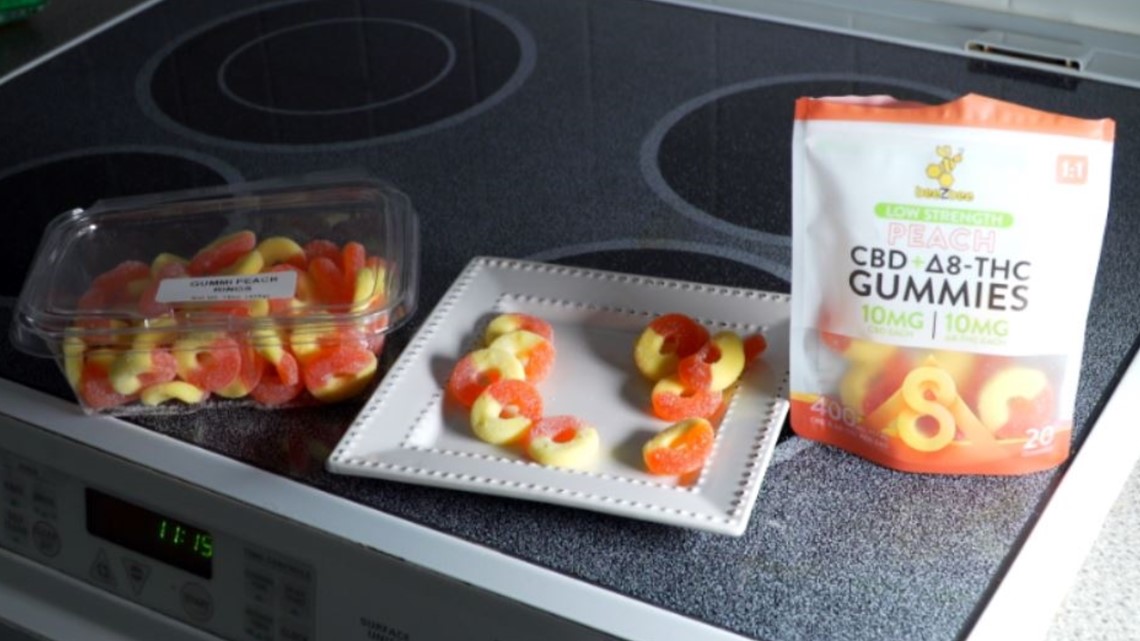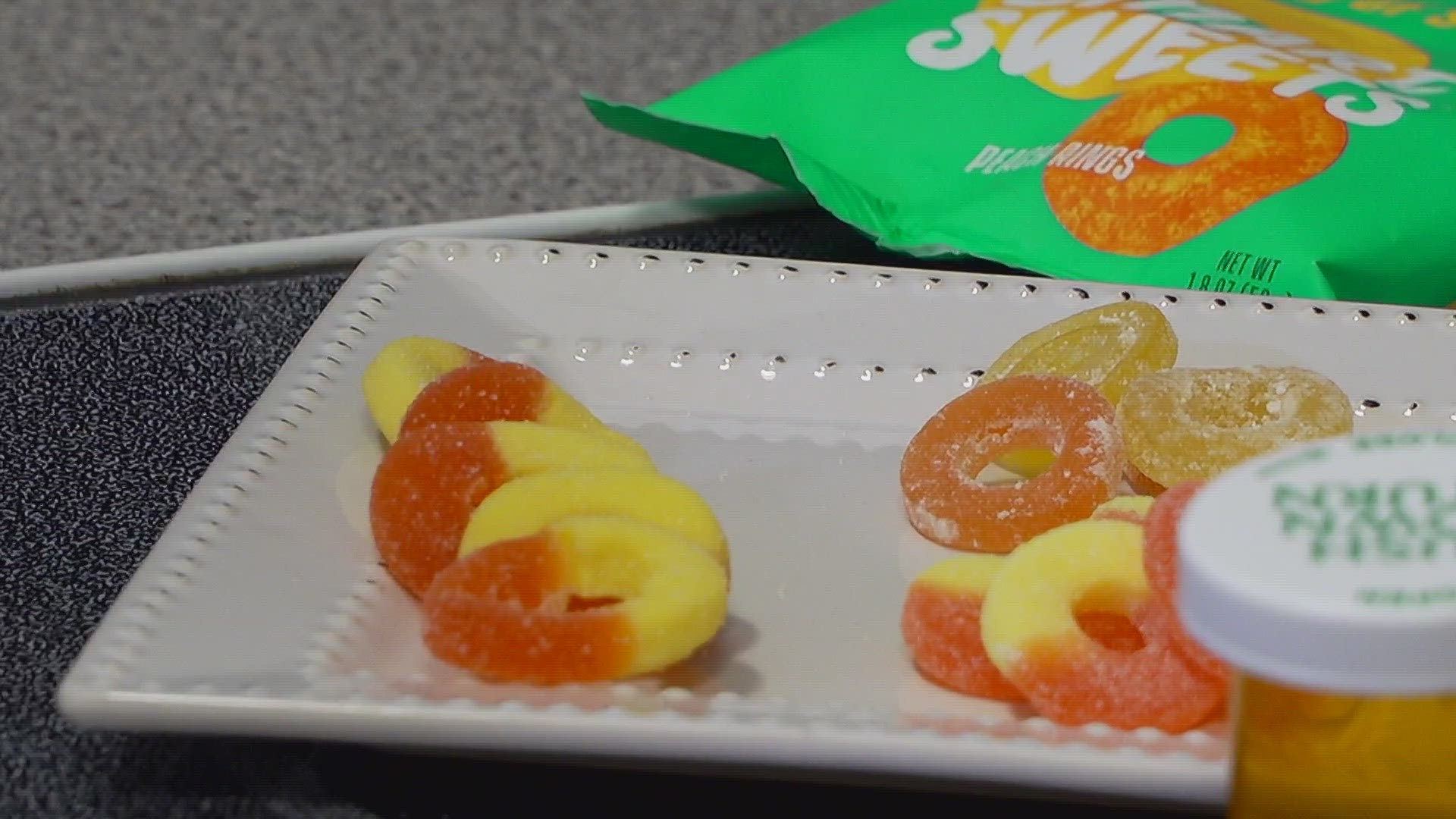INDIANAPOLIS — The Indiana Poison Center says calls for issues with edibles are up, and three-fourths of those calls involve children.
Reports involving small children – kids younger than 6 – nearly tripled in 2022 and resulted in some having to be hospitalized after ingesting CBD, THC or marijuana-laced snacks.
Those calls come from concerned parents and medical professionals – but do not account for all cases. The center believes there’s likely more instances of kids getting into these adult treats, but it guesses only the most severe are reported.
Dr. Blake Froberg, the medical director at Indiana Poison Center, says even legal CBD and low-level THC products can be problematic.
“CBD, we tend to see less effects with that and sometimes not many effects at all,” said Froberg. “One of the things with CBD is occasionally there are other things in those products: Delta-8, THC – that then can cause symptoms and issues."
THC is the active ingredient in marijuana that makes users high. Usually it's not an issue for adults, but it can lead to negative health effects in kids.
Marion County has the most calls statewide – 128 cases involving kids 12 and younger over a 6-year period, with cases growing exponentially over the years. The center says in the same time, Lake County had 54 cases, there were 33 cases for each Allen and St Joseph counties and 21 in Hamilton County.
Doctors tell 13 Investigates the best course of action for parents is to put the edibles away in a medicine bottle with a childproof lid. You may be able to get some from your pharmacy or buy them for just a few dollars. An even better option is to put edibles in a locked medical box. Many can be found for less than $50.
Not keeping these snacks away from kids can have negative consequences for both children and adults.
This Thursday, a Jennings County mom pled not guilty during her first hearing for a felony neglect charge. On Feb. 2, Amanda Johnson called 911 after her 5-year-old daughter wouldn’t wake up.
The sheriff’s office says the child needed to be airlifted to Peyton Manning Children’s Hospital in Indianapolis after ingesting "nerdy bears" laced with THC. The little girl regained consciousness the next day.
About a month later, Johnson was charged. Investigators say Johnson waited a day before seeking treatment – even though the girl was acting abnormal and lethargic and was thought to have gotten into the snacks. The sheriff’s office also reports its investigation found this was the second time the girl got into THC-infused snacks.
While CBD and THC products help many adults with sleep disorders, anxiety, and other ailments, they can have a negative effect on very small children.
Dr. Rachel Peterson at Riley Hospital for Children reports seeing more cases of kids getting sick from edibles. While some adults may think it’s no big deal, she says it can be very scary for some kids.
“When a kid ingests a THC-infused gummy or edible, the side effects include anything from nausea, vomiting, dizziness, headache... but it can also include what we would call altered mental status or what we call altered sensorium,” she said. “Where they may not feel like themselves.”
Maryland mom Elizabeth Perry said it was scary when her 2-year-old son Oliver ingested her prescription gummies. The boy started seizing and needed to be intubated.
"He started shaking and crying and looked at me with utter fear in his eyes,” Perry said.
Doctors told Perry to take less than one gummy to help her sleep. Little Oliver may have eaten more than 15.
At the same time these snacks are becoming more accessible, some are also made to look more kid-friendly. There are examples of edibles that are packaged and made to look like popular snack brands like Cheetos, Skittles, Gushers and Doritos.


13 Investigates bought some medicated peach rings at a local shop. The packaging was clearly marked, but once outside of their pouch, the THC-laced snacks were nearly identical to peach ring candies found at many stores.
"Now you or I might know that there's a dose-dependent relationship, but all a kid sees is candy,” Dr. Peterson said. “So, 10 gummies or 10 pieces of candy may not seem like a lot, but if you put THC in them, it can actually be quite a bit in a small child."
A study in Pediatrics showed, in 2021, there were 3,054 reports of kids under 6 eating edibles. That number is up 1,375%, or 14 times what poison centers across the country reported in 2017.
Researchers thought some of that was due to more states legalizing medical and recreational use of marijuana. However, in Indiana, marijuana is illegal but cases are still skyrocketing.
“We don’t have walls at the edges of our state borders,” said Peterson. “So we end up seeing effects from states over here in Indiana too. It’s not so hard to fly to Colorado.”
Or drive to neighboring Illinois or Michigan.
But again, kids can overdose even on products that are legal in Indiana.
The Indiana Poison Center reports, calls about edibles skyrocketed for all ages. In 2022, it received 183 edible related calls – 76 for kids under 6 years old and 60 for kids six to 19 years old. The year before, there were less than 30 calls for both age groups.
Froberg says not all of those kids end up in the hospital, but it’s still important for parents to call the poison center at 1-800-222-1222. The center’s medical professionals can help assess if a child needs to be observed at home, at a local doctors’ office or in a hospital setting.
While most kids will be OK, like Oliver, four-year-old Tanner in Virginia was not. Doctors say he died with "extremely high" levels of THC in his system.
The Spotsylvania County Sheriff's Office says Dorothy Clements allowed her 4-year-old son, Tanner, to eat at least one THC laced Gummy. She denied knowing the gummies had THC and told WUSA she thought they just contained CBD.
Investigators claim, had medical intervention occurred shortly after the ingestion, it could have prevented the death. His mom now faces a murder charge.
That’s a very rare case.
Still, it’s a reminder there is not much information on how these edibles impact children and if they have long-term effects on their development.

